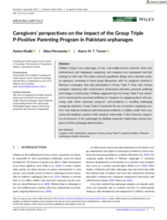Abstract:
Children living in the orphanages of low- and middle-income countries often face maltreatment and inadequate caregiving, and caregivers are unprepared and lack training for their role.
This study involved a qualitative design with a thematic analysis approach, consisting of focus group discussions with 14 caregivers working in Pakistani orphanages who had participated in Group Triple P. Four main themes emerged: caregiving skills enhancement, behavioural outcomes, personal wellbeing and change in relationships.
Findings suggested that the Group Triple P was beneficial in improving the perceived wellbeing of caregivers by equipping them with parenting skills which enhanced caregivers' self-confidence in handling challenging caregiving situations. Group Triple P promoted the use of positive caregiving practices that reduced emotional and behavioural problems in children under their care, along with building a positive child–caregiver relationship. It also fostered a supportive environment in the orphanages by building respectful relationships among caregivers and the orphanage administration.

